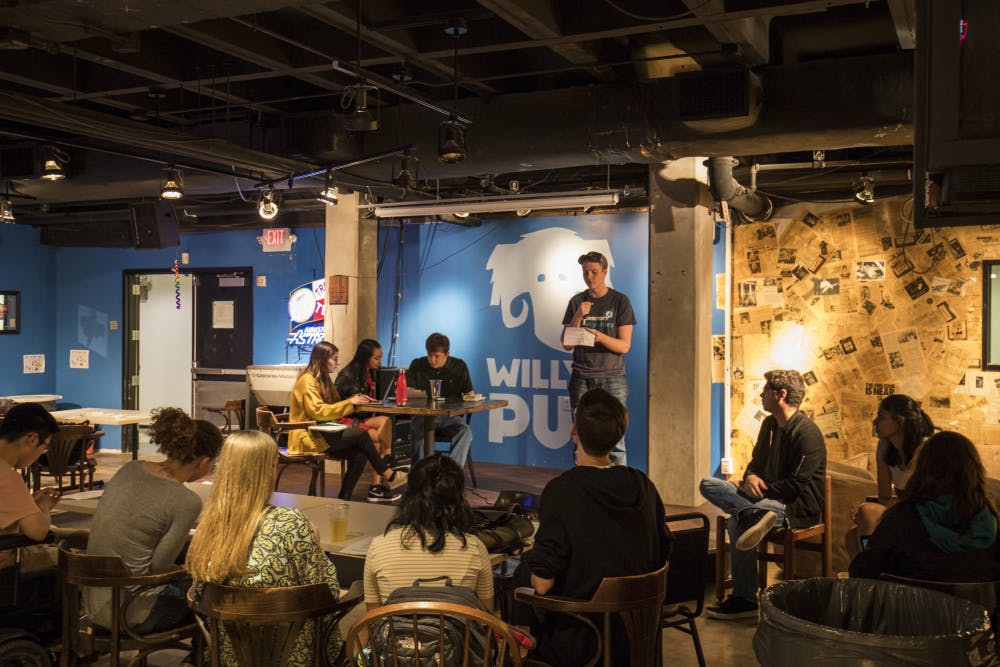Students discuss departmental improvements at Social Science town hall

Students from the School of Social Sciences gathered at Willy’s Pub on Thursday, Feb. 1 for a Social Sciences Town Hall to discuss perceived departmental and school-wide flaws and ways to enhance the undergraduate experience.
The School of Social Sciences is also currently working to better structure a social science statistics course that would be for all social science majors, according to Social Science Advisory Board member Caroline Lee. The Dean of the School of Social Sciences has put together faculty to write a tentative syllabi for what they think would be proper preparation for students who are doing research in their field, Lee, a Jones College junior, said.
The main themes of discussion involved the integration of statistics into the curriculum, the new social policy analysis major, and methods and funding for undergraduate research and capstone projects.
Before the town hall, a survey was conducted by the Student Advisory Board to gather general information from a group of social science students. 27.6 percent responded saying they anticipated needed funding in the near future for unpaid summer internship opportunities, independent research, senior thesis and travel for various interviews.
Tomas Arango, a Jones College sophomore, spoke about the difficulties of finding funding for opportunities in the social sciences, and mentioned a program, the Gateway Program, which used to provided funding for summer fellowships and international ambassadorships. Arango said that while funding is available from the Center for Career Development, it is limited and if students are not selected for the funding, they do not have many other options besides pursuing off- campus funding.
Rose Kantorczyk, a Lovett College sophomore, said the root of the funding problem is the lack of communication between the school and the students.
“There was no communication about the fact that these programs do not exist anymore,” Kantorczyk said. “They were still on the website, and I went through the experience of trying to apply and not finding out they were not offered anymore until much later.”
Social sScience students also voiced discontent with the introductory course requirements, citing that the course Public Policy (POLI 337)POLI 337 did not operate well as an introductory class for the SOPASocial Policy Analysis (SOPA) major due to the mixture of students,everyone from freshmean to seniors.
Jaewoo Park, a Duncan College junior, suggested having an introductory course that is standardized to be a broad survey of the major itself, and is not necessarily upper level.
“I think the biggest issue fundamentally was having a lot of people who thought they were signing up for a 300- level policy analysis seminar with a bunch of freshman who signed up for a cool new major,” said Park. “This did not necessarily make it the best learning environment or lead to fairness in grades.”
A second suggestion by Arango was to increase the James A. III Baker Institute for Public Policy’s involvement with the SOPASocial Policy Analysis major to help students identify what sort of policy they’re interested in.
“The [Baker Institute Introduction to Public Policy (POST 201)]POST 201 class involved the Baker Institute but was canceled this past semester because the freshman who would normally take it instead had to take the SOPA 200 classes,” said Arango. “I think it’s really important to take advantage of the resources that we have on campus to try to develop a better program for policy majors.”
Nina Kalluri, a Brown College junior, expanded on the idea of introductory courses, suggesting that statistics classes across all social science disciplines offers a greater degree of consistency.
“I know there are students double majoring in the social sciences, who have to take different statistics classes that use different programs, making the learning process more complicated,” Kalluri said. “I think it’s a very useful skill for any social scientist to be well trained in either Stata or RStudio, but whatever they choose to do it well.”
Expanding on this idea, Sonia Torres, a Hanszen College junior, said that statistics courses couldwould be used to explore teamwork across multiple social science disciplines.
“It would be interesting if in this conversation we create a social science statistics course that adopts the idea of project- based thinking where we can first promote interdisciplinary working and gain from that experience for the post-Rice professional world,” Torres said.
More from The Rice Thresher

O’Rourke rallies students in Academic Quad
Former U.S. Rep. Beto O’Rourke of El Paso, Texas spoke in front of the Sallyport to a sea of sunglasses and “end gun violence” signs April 17. The rally, organized by Rice Young Democrats, took place in the academic quad from noon to 2 p.m.

Five international visas revoked at Rice
Federal authorities have revoked visas for five international affiliates at Rice — three current students and two recent graduates, President Reginald DesRoches announced in an April 11 message to campus. The revocations are “not related to social activism or protests,” a university spokesperson told the Thresher.

Modified Beer Bike races rescheduled to April 18
Beer Bike races have been rescheduled for April 18 at 5-8 p.m. The makeup event was announced in an email to Beer Bike captains, coordinators and stakeholders, from the campuswide coordinators and the Bike Captains Planning Committee.

Please note All comments are eligible for publication by The Rice Thresher.